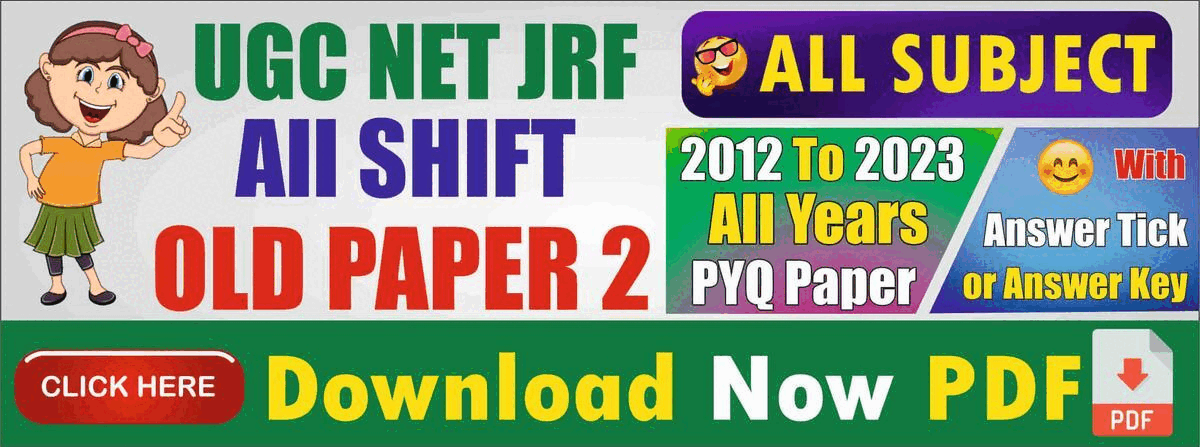Are you searching for the UGC NET Social Work Syllabus 2023 PDF Download? Look no further, as we have compiled all the important details and tips to help you prepare for the exam.
The UGC NET Social Work exam is conducted by the National Testing Agency (NTA) for candidates who wish to pursue a career in the field of Social Work. The exam assesses the candidates’ knowledge in the subject and tests their eligibility for lectureship and research fellowships.
If you are planning to appear for the UGC NET Social Work 2023 exam, it is important to have a thorough understanding of the syllabus and exam pattern. In this article, we have compiled all the important information you need to know about the UGC NET Social Work Syllabus 2023 PDF Download
UGC NET Social Work Exam Pattern 2023:
The UGC NET Social Work exam consists of two papers – Paper 1 and Paper 2. Both papers are conducted on the same day, and the duration of each paper is 3 hours. The exam is conducted online, and each question carries 2 marks. There is no negative marking for incorrect answers.
The UGC NET Social Work Exam consists of two papers: Paper 1 and Paper 2.
Paper 1:
- Duration: 3 hours
- Number of questions: 50
- Total marks: 100
- Type of questions: Multiple Choice Questions (MCQs) based on general aptitude, teaching and research aptitude, and current affairs.
Paper 2:
- Duration: 3 hours
- Number of questions: 100
- Total marks: 200
- Type of questions: MCQs based on Social Work subjects.
Both papers are conducted in a single session with no break in between. The candidates are required to appear for both papers to be considered for the selection process.
It’s important to note that there is no negative marking for incorrect answers in UGC NET Social Work Exam.
UGC NET Social Work Syllabus 2023: Download PDF
The UGC NET Social Work syllabus is divided into two parts – Paper 1 and Paper 2. Here’s a detailed syllabus for both papers.
Paper 1 Syllabus:
Teaching Aptitude:
- Teaching: Nature, objectives, characteristics, and basic requirements.
- Learner’s characteristics: Characteristics of adolescent and adult learners, and individual differences.
- Methods of teaching: Teacher-centered vs. learner-centered methods; Off-line vs. online methods.
- Evaluation systems: Elements and types of evaluation, evaluation in higher education, and grading system.
Research Aptitude:
- Research: Meaning, types, and characteristics.
- Steps of research.
- Methods of research.
- Research Ethics.
Reading Comprehension:
- Comprehension passages.
Communication:
- Communication: Nature, characteristics, types, barriers, and effective communication.
- Verbal and non-verbal communication.
- Classroom communication.
Logical Reasoning:
- Understanding the structure of arguments.
- Evaluating and distinguishing deductive and inductive reasoning.
- Verbal analogies.
Data Interpretation:
- Sources, acquisition, and interpretation of data.
- Quantitative and qualitative data.
- Graphical representation and mapping of data.
Paper 2 Syllabus:
Nta Ugc Net Social Work Syllabus 2023 in English
Here you can check the latest UGC NET Syllabus For Social Work Paper-II 2021 for English Medium.
- Social Work: Definition, Scope, Principles, Nature, Goals, and Process
- Historical Development: Development of Professional Social Work across the world (U.K., U.S.A., and India)
- Social Reform and Professional Social Work: Contribution of Social Reformers in 19th and 20th Century in the development of Professional Social Work in India.
- Social Work as a Profession in India: Values, Competencies, and Code of Ethics for the Social Work Practitioners
- Theories: Theories for Social Work Practice
- Changing Context of Social Work Practice: Emerging Perspectives, Trends and Challenges of Social Work for Practice
- Social Work Practice in various settings:(Family, Child and Youth Welfare, Industry, Older Persons, Persons with Disabilities, Environment, Women and Welfare, Healthcare and Disaster Management.)
Unit II: Society, Human Behavior and Communities
- Sociological Concepts: Social Structure, Social Institutions, and Social Groups, Socialization, Social Control, and Social Change.
- Approaches to the study of Society: Functionalist, Conflict/Dialectical, Structuralism and Post Modernism.
- Social System and Stratification: Major Social Systems (Family and Religion), Social Stratification: Marxist, Functionalist and Weberian approach.
- Human Behavior: Normal and Abnormal Behaviour Determinants and Life span perspective of Human Development, Development Tasks, and Hazards during Pre Natal Period, Infancy, Babyhood, Childhood, Puberty, Adolescence and Adulthood.
- Theories of Personality: Psycho-Analytic Theory of Personality, Behavioral theories, and Humanistic theories
- Social Psychology: Social Perception, Attitude formation, Change and Measurement, Communication and Theories of Collective Behavior.
- Type of Communities: Rural, Urban, Tribal, and Virtual Communities and various Vulnerable Groups/ sections viz. Women, Child, Aged, Dalits, etc; Caste and Class – Their Characteristics
- Basic Social Case Work Concepts: Social Roles, Social Functioning, Need Assessment, Adaptation, Social environment, Person-in-Environment Fit, Principles, and Components.
- Approaches to Social Case Work Practice: Diagnostic and Functional Approach, Problem Solving, Task Centered, and Radical Approach.
- Process and Techniques of Social Case Work: Phases of Case Work Intervention, Techniques of Case Work Intervention, Principles of Interviewing and Case Work Recording
- Social Group Work: Definition, Characteristics, Functions and Group Structure, Classification of Groups and making of Social Groups, Issues of Identity, Diversity, and Marginalization
- Social Group Work Process and Group Dynamics: Principles, Determinants, Indicators and Outcomes, Decision making and Problem Solving Process, Theories of Leadership, Roles, and Responsibilities of Group Leaders
- Group Development: Stages of Group Work, Techniques and Skills in Group Work, Group Climate, Communication in Groups, Use of Programme Media and Group Work Recording, Monitoring and Evaluation.
- Practice Sites of Social Case Work and Social Group Work: Client Groups and various settings (Children, Correctional, Health, Women, Persons with Disabilities, Older Persons, Oppressed Groups, Religious Minorities, Persons who are Gay & Lesbian and other Socially and Economically Disadvantaged Groups)
- Community Organization – Concept, Definition, Scope and Historical Perspective in India, UK, and the USA, The Role of Community-Based Organizations, Human Capital & Social Capital
- Process of Community Organization: Steps in Community Organization, Methods, Principles, Skills, Assumptions, Record Maintenance, Involving NGOs in Community Organization
- Approaches in Community Organization Practice – Models, Strategies, The role of community-based Organizations, Leadership Development and Leaders, Building Partnerships and coalitions
- Social Action and Social Movements: Concept, History, Social Action as a Method of Social Work.
- Models of Social Action: Conscientisation model of Paulo Freire, Role of ideology, Saul Alinsky as a radical community organizer, Liberation Theology.
- Social Movements: Origin, Nature, Types of Movements, Theories of Movement and new Social Movements
- Social Movements, Social Action and Social Change: Movement Analysis: Ideology, Structure, Leadership, Process and Outcomes, Analysis of ideology and approach of (Gandhi, Martin Luther King Jr. and Frantz Fanon)
- Section A: Quantitative Research
- Basics of Social Science Research: Meaning of Research, Social Science and Social Work Research: Meaning, Nature, and Scope
- Steps in Social Science Research: Identifications and Formulations of Research Problem, Literature Review, Objectives and Hypothesis Formulation, Research Design, Social Work Design, Sources, Methods and Tools of Data Collection, Processing and Analysis of Data and Writing Research Reports including Presentations and Styles of References, Citing and Paraphrasing.
- Basic Statistical concepts: Process of statistical Enquiry and dealing with Descriptive and Inferential Statistical Methods, Parametric and Non- parametric Tests.
- Section B: Qualitative Research
- Qualitative Research: Meaning, Basic tenets of Qualitative Research, Difference between Quantitative and Qualitative Approach to Research in Social Work.
- Designing Qualitative Research: Steps, Methods of Qualitative Research (Field study, Case Study, Focus Group Discussions, Narratives, Observation, and Theoretic Research)
- Managing Qualitative Data: Procedures and Techniques of Analyzing Qualitative Data and Report Writing.
- Section C :
- Mixed-Method Research: Components of Mixed Methods, Procedures of Combing Quantitative and Qualitative research.
Unit VI: Administration, Welfare and Development Services
- Social Welfare Administration: Meaning, History, Principles, Nature, and Type of Organizations.
- Types of Administration: Distinction between Social Welfare Administration, Public Administration and Social Security administrations.
- Registration of Welfare Agencies: Laws relating to Societies, Trust and Non – Profit organizations, Challenges
- Structure of Social Welfare Administration: Service Providers, Administrative structures (Government and Non – Government), Organization and Management of Institutional Welfare Services
- Components of Administration: Planning, Coordination, Staff Recruitment, Training and Development, Recording and Documentation, Budgeting, Monitoring and Evaluation, Networking and Maintaining Pubic Relations
- Strategies and Mechanisms of administration: Role of Social Workers in Decision Making Process, Communication, Role Description and Functioning, Sustainability of Programmes
- Fundraising and Resource Mobilization: Grant-in-aid (Principles and Procedures), Resource Mobilization, Financial Administration and Social Marketing – Process and Models.
- Social Policy: Concept, Goals, Scope, Context, and Models of Social Policy and applicability in the Indian context.
- Historical Development: Evolution and Historical perspective of various Policies, Implementation of Social Policies especially for Marginalized and Vulnerable sections of the society
- Process of Policy Formulation: Determinants and Steps, Approaches to Social Policy formulation, Impact of changing Political Scenario in a country.
- Social Planning; Concept, Objectives, Scope, Models, Interrelationship between Social and Economic Planning, Social Planning in India
- Five Year Plans: Changes in Social Planning with Five Years Plans in India, Social Planning and Social Change, Factors leading to the development of planning in India. Roles and functions of Niti Aayog
- Social Development: Positive and Negative Dimensions of Social Development; Concept, Models and Theories, Historical and Social Context of Development in India,
- Sustainable Development: Concept, Strategies, Critical issues, Salient Features of Social Development. Approaches to Social Development; Similarities and Differences.Strategic Development Goals, Human Development Index and Indicators for Policies and Programmes
- Indian Constitution: Characteristics, Features, Preamble, Directive Principles of State Policy and Articles
- Social Justice: Concept, Definition, Historical Development, Dimensions, Manifestations and Social Justice as a Core value of Social Work Profession.
- Social Justice and Leadership: Community Building, Personal and Community Empowerment, Social Justice and Technology, Promoting a Plan and Vision for Change, Reflections and Connection, Social Reconstructions, Paradigms, Policies, Privileges, Implications of Social Justice for Policy Formulation
- Instrument of Social Justice: Constitutional Base and Indian Legal System, Legal and Public Advocacy, Role of Civil Society as a Pressure group, Statutory bodies.
- History of Human Rights: Concept and Historical Context of Human Rights, Human Rights Declarations, Treaties and Conventions, Human Rights and Protection Systems, Human Rights in the Indian Context
- Human Rights and Social Work: Code of Ethics of Social work and Protection of Human Rights, Human Rights perspective in Social Work Practice, Ethnic sensitive practice, Feminist Practice, Social Work with Diverse Groups.
- Violation of Human Rights and Social work practice: Social Work with the Victims of Human Rights Violations and Human Rights Activism. Role of UNHCR, National Human Rights Commission and International Human Rights Agencies.
(Health Care Social Work Practice, Social Work with Older Persons and Persons with Disabilities, Gender, Labour Welfare, Industrial Relations, Personnel Management and Human Resource Management)
- Medical Social Work and Psychiatric Social Work: Concept, Evolution, Roles, Functions / Responsibilities of Medical Social Workers and Psychiatric Social Workers.
- Mental Health and Disease: Normal and abnormal behaviour, Epidemiology, Etiology, Types, Clinical Manifestation and Management of Schizophrenia, Mood Disorders, Neurotic Disorders, stress-related Disorders, Somatoform Disorders, Child and Adolescent Mental Health Problems, Legislations related to Mental Health.
- Theories of Aging and Vulnerability: Psychological and Sociological Theories of Aging, Psychological, Social, Physical needs and problems of Older Persons. Rights of Older Persons against Neglect, Abuse, Violence and Abandonment and Social Work Interventions
- Persons with Disabilities: Models of Disability, Disability Movement – Historical Perspective, National and International Milestones from Welfare to Right based Approach, Legislative Measures and Social Work Interventions
- Gender and Development: Expressions of Gender Disparity in Education, Health, Property, Employment and Livelihood, Decision Making, Feminization of Poverty and Manifestations of Gender-based Violence. Constitutional & Legislative Safeguards and Social work Interventions.
- Labour Welfare & Human Resource Management (HRM): Historical background of Industrial Development as a sub-system of society, Concept of Labour Welfare, Nature, Objectives, Principles, Theories, Principles of labour welfare, Labour Legislation, Human Resource Management: Concept, Scope, Evolution, Theories, Models, Sub-systems, Human Resources Development (HRD) – Performance Management System, Types, Six Sigma, ISO, Total Quality Management, Corporate Social Responsibility(CSR) – Concept, Issues, Practices, Models, Components, Approaches and Corporate Governance.
- Personnel Management and Industrial Relations: Concept, Definition, Objectives, Scope., Functions, Determinants and Reflectors of Industrial Relations, Models of Industrial Relations, Globalization and Industry, International Labour Organization(ILO) Role, Functions; Collective Bargaining, Job Analysis, Manpower Planning, Organization Behaviour and Organization Development Interventions.
(Social Defence and Correctional Services, Social Work with Families and Children, Environment and Social Work, Social Work and Disaster Management)
- Social Defence: Concept, Philosophy and Changing Dimensions, Children in Need of Care and Protection, Juveniles in Conflict with law, Street and Working Children and Young Offenders, Probation and Parole. Emerging issues in Social Defence.
- Legislations and Criminal Justice System: Juvenile Justice (Care and Protection of Children) Act, 2000, Immoral Traffic Prevention Act 1986, Probation of Offenders Act, 1958, Beggary Prevention Act, Narcotic Drugs and Psychotropic Substance Act 1986, Prison Act, and Criminal Justice System.
- Social Work with Families: Functions, Developmental Stages and Family patterns, Family Dynamics and Theoretical Models of Family Functioning (Circumflex model, Mc Master Model and Structural Model) and Social Work Interventions
- Child Development: Concept, Philosophy and Historical context, State of Children in India – Demographic Profile, Education, and Protection
- Policies & Programmes for Children: Constitutional Provisions, National Policy on Children, International perspective and UN convention on rights of children, Programmes and Legislative Measures related to Female Feticide, Adoption, Foster Care, Guardianship and Child Marriage and Social Work Interventions.
- Environment and Social Work: Causes and Consequences, Differential impact on Women, Poor, Marginalised Groups and Indigenous Populations. The environment in the Human Rights Perspective. Environmental Movements and social work
interventions in the management, protection and promotion of the environment.
- Social Work and Disaster Management: Disaster-related concept and Definitions: Hazard, Risk, Vulnerability and Disaster, different forms of natural & manmade disasters. Impact of Disaster and Disaster Management Initiatives, Pre and Post Disaster Interventions.
Paper 2 Syllabus Download Pdf:
Ugc Net Social Work Syllabus 2023 in English
Ugc Net Social Work Syllabus 2023 in Hindi
Preparation Tips for UGC NET Social Work Exam 2023:
Here are some tips for preparing for the UGC NET Social Work exam 2023:
- Understand the syllabus and exam pattern thoroughly.
- Make a study plan
- Refer to standard textbooks and study materials recommended for the exam.
- Practice previous year question papers and mock tests.
- Focus on time management and accuracy while attempting the questions.
- Take regular breaks and maintain a healthy lifestyle to avoid burnout.
- Join coaching classes or online courses if necessary.
- Stay updated with current affairs related to the Social Work field.
Important Points:
- The UGC NET Social Work exam is conducted by NTA for candidates who wish to pursue a career in Social Work.
- The exam assesses the candidates’ knowledge in the subject and tests their eligibility for lectureship and research fellowships.
- The exam pattern of UGC NET Social Work 2023 includes multiple-choice questions and is conducted in online mode.
- The marking scheme of the exam is +2 for a correct answer and no negative marking for incorrect answers.
- The duration of the exam is 3 hours, and the number of questions is 150.
- The UGC NET Social Work Syllabus 2023 PDF Download is an important document that provides a detailed outline of the topics that will be covered in the exam.
- To download the syllabus, candidates can visit the official website of NTA and click on the link provided.
- The syllabus is available in PDF format and can be downloaded for free.
- The syllabus is divided into nine units, each covering a specific topic related to Social Work.
- To prepare for the exam, candidates must understand the syllabus, make a study plan, practice previous year question papers, join a coaching institute, take mock tests, and revise regularly.
FAQs:
- Is there any negative marking in the UGC NET Social Work exam 2023? Ans: No, there is no negative marking for incorrect answers.
- Can I download the UGC NET Social Work Syllabus 2023 PDF from the official website? Ans: Yes, the syllabus is available for download on the official website of NTA.
- What is the duration of the UGC NET Social Work exam 2023? Ans: The duration of each paper is 3 hours.
Also Check:
Conclusion:
In conclusion, the UGC NET Social Work exam 2023 is a crucial opportunity for aspirants who want to pursue a career in the teaching or research field. To crack the exam, it’s essential to have a clear understanding of the syllabus, exam pattern, and prepare accordingly. With a comprehensive understanding of the UGC NET Social Work Syllabus 2023 PDF download and proper preparation, you can clear the exam with flying colors.





